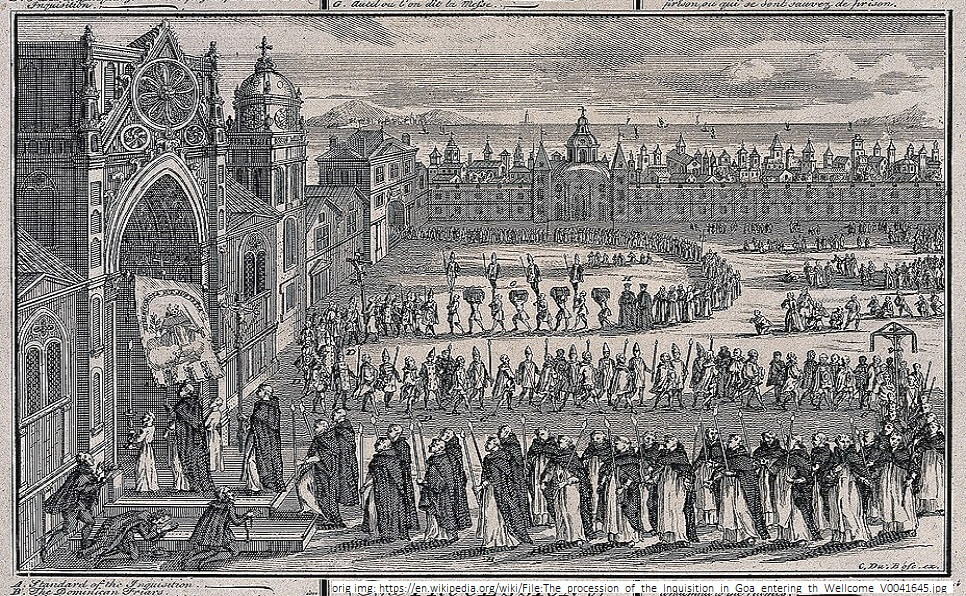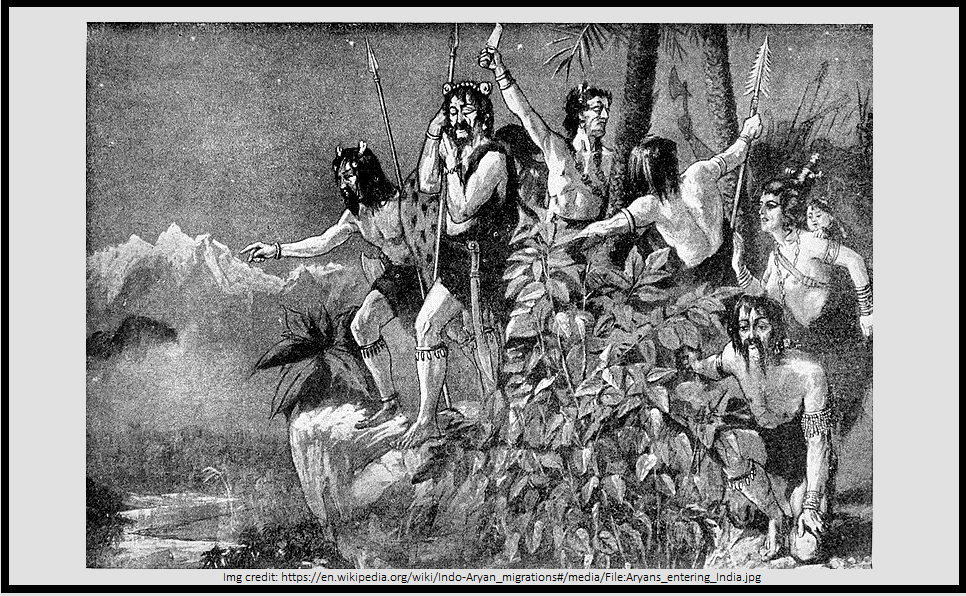The Goa inquisition by the Portuguese is considered to be one of the most violent inquisitions by historians. Following Spain and Portugal, the ruthless machinery of systematic persecution of heretics was put into action in Goa during the Goa Inquisition.
The Goa inquisition started in 1560 during the Portuguese rule with an objective to enforce Catholic Christianity and was abolished in 1812. It was temporarily suspended from 1774 to 1779. The official records of the inquisition are not available. In the absence of these, the details are drawn mainly upon the documents in the official archives in Goa, and published contemporary correspondence of Inquisitors and Jesuit missionaries as well as accounts of contemporary European travelers to India. The first part focuses on the background of the inquisition and anti-hindu laws targeting marriage customs, childbirth customs, death customs and fasting customs.
Since the beginning of Portuguese rule in Goa, the persecution of the Hindus and the movement to destroy Hindu temples and other vestiges of Hindu religion had started. Many Hindus had already been converted by the use of temptations and pressures in various forms. Following the inquisition in Portugal, the New Christians (converted Jews) of Portugal largely availed themselves of the opportunities provided by the colonial trade in the East and established themselves in Goa and its dependencies. Both the converted Hindu & Jews practiced the rites and rituals associated with their old religion. Owing to this laxity by converted Hindus & Jews, the Portuguese missionaries demanded the.establishment of a Holy Tribunal in the East. The first demand for the establishment of the Inquisition in Goa was made by St. Francis Xavier in 1545. Finally, the inquisition was established in Goa in 1560 to prevent, detect and punish heretical tendencies.
To prevent natives as well as converted christians from practicing their old customs and to maximize conversions of natives, the Portuguese passed several laws targeting the natives, their customs and rituals.This included several orders which made it difficult for the natives to continue to retain their old religion as well as provide positive incentives for conversion to Christianity. The temples and shrines of the Hindus were destroyed and they were forbidden to create or maintain new ones. Practice of Hindu rites and ceremonies such as the marriage ceremony, the ceremony of wearing the sacred thread, ceremony performed at the birth of a child, was banned. Priests, teachers of the Hindus and Hindus whose presence was considered as undesirable from the point of view of propagation of Christianity were sent into exile. Orphan children of the Hindus were snatched away from their families for being baptized. People were compelled to listen to the preaching of Christian doctrine.
Below are some of the laws targeting natives passed during the Goa inquisition:
Restrictions on marriage customs
- At the time of fixing weddings, making payment of dowry, or giving wedding presents, the natives of India should not invite relatives of the bridegroom and bride to attend such functions.
- For any other functions pertaining to weddings, one should not send from the house of the bridegroom to that of the bride, or vice-versa, flowers of any kind, betel-leaves, areca-nuts or any other things which could be substituted in the absence of these objects.
- On the occasions of their marriages and all other functions either in the house of the bridegroom or of the bride, Vovios (traditional songs) should not be sung on any occasion either in public or in private. The female relatives of the bridegroom should never sing in such functions.
- In the functions of their marriage, natives should not anoint the groom or bride with a mixture of ground saffron, milk, coconut oil, rice powder, crushed leaves of abolim plant or any other things.
- They should not erect pandals with decorations of leaves at the gates of the houses of the bridegroom and bride.
- On the day of the wedding or any subsequent day, in the house of the bridegroom or the bride, no person should touch their foreheads with grains of raw rice or perform any other similar ceremony.
- When the married couple go from the house of the bride to that of the bridegroom, or from that of the bridegroom to that of the bride, neither they nor any persons who accompany them should take paddy, areca-nuts, cakes, coconuts, rice or any other edible thing.
- In the functions of their marriages, and all other related functions, the natives should not distribute betel leaves and areca-nuts to those present at the house of the groom or bride, publicly or in private.
- The natives should not use Gaitas, or other Hindu musical instruments during the celebration of their marriages or on occasions connected with it.
Note:- Later during the Goa inquisition, an order was passed banning Hindus to perform marriages in Portuguese territory. Later the order was changed to allow Hindus to perform marriages in ships or barges in the rivers which separate the Portuguese territories from the territories ruled by Muslims, provided no Christians were present.
Restrictions on child birth customs
- On the birth of the child, the natives should not place their child on raw rice.
- On the sixth day of the birth of their sons and daughters, the natives should not celebrate the function of keeping vigil with banquets, public or private, or gathering of many persons at their houses.
- On the days of the confinement of their wives or even before or after such confinement, the place in the house where the confinement has taken or is to take place should not be coated with cow-dung
- The ceremony of keeping vigil and giving feasts at the birth of children was forbidden.
Restrictions on death customs
- On the death of a person, the natives should not coat the place or the house of the deceased with cow-dung.
- The natives should not throw the clothes used by the deceased person or his bed into the sea or river; and if it is necessary to discard, these things should be burnt.
- On death of the relatives or during the season when functions in memory of the deceased are held, the natives should not arrange feasts in their houses in memory of their deceased relatives.
Restrictions on keeping fasts
- The natives should not observe fasts on days of the new moon or full moon, the eleventh day or twelfth day of the new moon or full moon, nor on any other days on which the Hindus are accustomed to fast as per the Hindu custom
- On the days of eclipses of the moon, the natives on the days should not observe fast until the eclipse ends nor hold banquets.
- The natives should not observe as feasts on days of the new moon or full moon, or the twelfth days following the new moon or full moon, nor any other days which according to the Hindu custom are so observed and shouldn’t hold banquets.
Other restrictions
- Men should not wear dhoti either in public or at home and women should not wear cholis (like it was customary)
- The natives should not have Tulsi plants in their home gardens, anganas (houseyards), cocoanut gardens, or other properties, and if it exists in any place it should be uprooted immediately.
- Hindus were forbidden to wear the sacred thread. The thread ceremony of young sons of the Hindus had also to be performed outside the Portuguese territories.
- Hindus were forbidden to anoint their foreheads with sandalwood paste and rice.
In the second part, we will focus on humiliation and banishment of Hindus, laws depriving Hindus of their means of livelihood, snatching of Hindu orphans and privileges available on conversion during Goa inquisition.
Reference:
The Goa Inquisition – The terrible tribunal for the East – A K Priolkar


